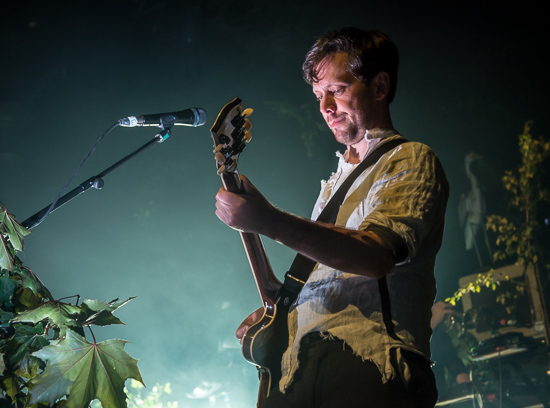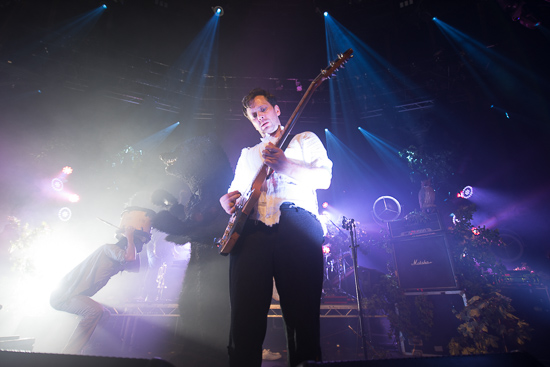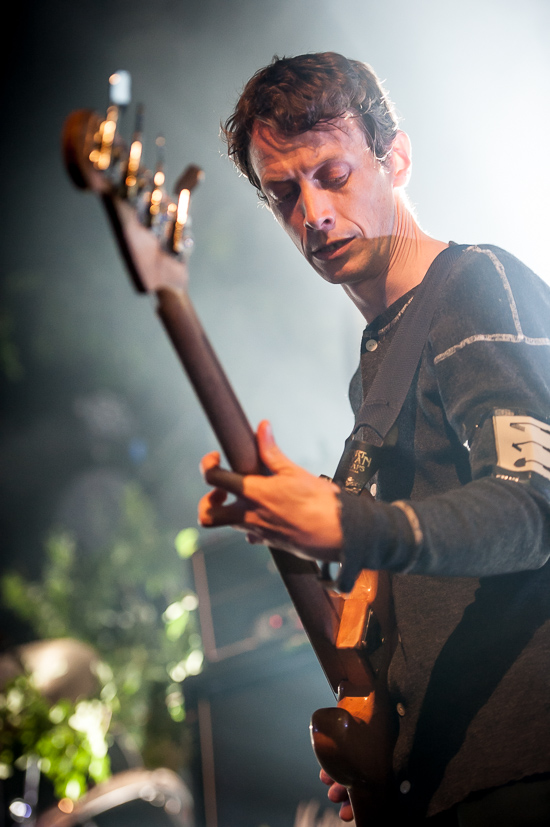It may be the telescoping of time which comes with age, but when taxi drivers, or drunkards on late-night trains, or half-interested strangers at parties, find out what I do for the living and ask "Who’s new that I ought to be listening to, then?" the embarrassing truth is that my brain still instinctively reaches for the same answer it’s reached for since the first knockings of the new millennium: you should be listening to British Sea Power.
Perhaps it’s the fact that they never made a zeitgeist-grabbing mainstream breakthrough, and therefore aren’t fixed to a particular moment in time, which means I subconsciously still perceive them as a ‘new’ band (if you were never ‘now’, it follows that you can never be ‘then’). Perhaps it’s the fact that they’ve always stood apart from fashion, drawing on pre-rock & ‘roll sartorial styles (if not musical ones), long before such things were hijacked by sockless frequenters of cereal cafes. And the way that they seem to embody interbellum virtues as forbearance, resilience, stoicism, courtesy and intrepidity. Trevor Howard virtues. David Niven virtues.
But British Sea Power belong to a parallel present tense, running alongside our mundane reality, which doesn’t seem to have a chronological start or end point. All of which explains why it feels bizarre that BSP are doing a few gigs where they play their classic debut, The Decline Of British Sea Power, a record which – to me, at least – feels like it only came out the day before yesterday.
Now, it goes without saying that certain people will have something to say about the band’s decision to do this. One of the most tedious features of the music commentary scene is people moaning about artists playing their classic albums. Don’t get me wrong, those were important and influential moans in their day, a decade ago, but rehashing those old moans now, word-for-word, is lazy and speaks of a lack of creativity and spontaneity. It was much better first time around. I can’t imagine anything more deadening than reading a moan and knowing exactly which sentence is going to come next. I might as well just read the original. Either come up with a different moan, or move aside to make way for newer, younger moaners.
Fuck ’em, frankly. Turning up to the Decline gig fresh, without a recent re-listen to refamiliarise, you’re immediately struck not only by how effortlessly British Sea Power do the non-obvious thing with rock & roll, but how they do the non-obvious thing around it. With Edwardian hair and crisp white shirts, they walk on to a recording of TS Eliot reciting his Triumphal March in clipped Received Pronunciation tones ("Stone, bronze, stone, steel, stone, oakleaves, horses’ heels…"), itself paraphrased by BSP in ‘Carrion’. After the forty second choral overture ‘Men Together Today’, they rampage into the crazed Russian klezmer-punk of ‘Apologies To Insect Life’, with its glorious opening line "Oh, Fyodor, you are the most attractive man…" It owes a debt, of course, to Pixies (the Pixies of hurtling Hispanic tracks like ‘Vamos’ and ‘Isla De Encanta’), as does the equally crazed ‘Favours In The Beetroot Fields’ which follows, but ‘Something Wicked’ offers an interlude of idyllic, bucolic respite before Yan fires up the ignition with ‘Remember Me’, their still-astonishing memento mori of a debut single, a song which retains the power to send electrical frissons through the viscera and prickle the arm-hairs of the recently-Veeted.
The foliage is back, not that it ever really went away, as is the ornamental owl. More importantly, so is Eamon, the keyboardist, mascot and drum-beating leader of the dance from their early years (before he went off to form Brakes), pushing through the crowd in a fur-lined flying helmet while bashing a head-high tom. (He’ll later have to apologise on mic to someone in the front row for "crushing your head earlier").

Yan delivers as impassioned a rendition of ‘Carrion’ as I’ve ever heard. It’s still their single most overwhelming song, and particularly potent if its epic Cinemascope grandeur hits you through the headphones in the right place (for me, a windswept expanse of sand at Whitmore Bay on a deserted Barry Island in November). Its use of language is sheer poetry: "Oh, the heavy water, how it enfolds/The salt, the spray, the gorgeous undertow/Always, always, always the sea/Brilliantine mortality…"
Yan’s brother Hamilton gives us a beautiful ‘Blackout’, a song which might be the only in the history of recorded music to include the word ‘tumuli’, and which features the telling couplet "For you have drunk all your beer, go drown your empty selves/For then you will have lost it all, the last of this island." Because a keen awareness of what has been lost, and what may soon be, is central to the poignancy of British Sea Power. This sense of dread is also central to ‘Fear Of Drowning’ ("Jesus fucking Christ, oh God no…", "All the money in the world won’t help you now, the only way is down…")
It’s essential, however, to understand that BSP are not Little Englanders mourning the fall of the Empire, nor conservatives of any stripe, with an upper or lower-case ‘c’. Quite the opposite. Nor are they merely bookish cranks obsessed with vintage historical and botanical curios. They’re a band who have made clear their opposition to austerity and philistine cuts to public services (‘Who’s In Control’) and anti-European xenophobia (‘Waving Flags’, played in tonight’s second half), and as a result, seem more relevant than ever in the wake of the General Election result. Their concerns about environmental destruction, too, have only become more painfully prophetic. Since they wrote ‘O Larsen B’ (also played tonight), an elegy to the Antarctic ice shelf which partially collapsed in 2002, NASA reported in May this year that fissures and fractures in the remaining ice are visible from space, suggesting that the entire shelf may disintegrate in the near future.

You catch yourself wondering why a band so patently brilliant aren’t one of the biggest in the country. But the reason is fairly straightforward: they aren’t an easy three-word sell. I’ve written thousands of words about BSP over the years, and I still don’t feel I’ve captured their enigmatic essence. For all their conventional indie rock melodicism, they’ve always been just far enough over the threshold of strangeness to stop them ever becoming the size of, say, Muse (who cleverly stay just on the safe side of that line).
You’re wondering, Father Abraham-like, where they are oh-coming from? Read the peerless biography/memoir Do It For Your Mum by Yan and Hamilton’s big brother, Roy Wilkinson. Most likely, you still won’t know. I’m not sure Roy does, and he’s related to them. (I’ve met them on many occasions, DJed for them half a dozen times, even conducted a slightly awkward radio interview with them, but I still catch myself before saying hello in the street. What on earth can you say to British Sea Power?) They are that vital thing: a band who, had they not existed, no-one else would have thought to invent them.
This seaside premiere is, technically, is a warm-up show for the London Roundhouse, but you can’t tell that to a Brighton crowd. Brighton knows that BSP established themselves here with their legendary Club Sea Power nights (later revived as Krankenhaus), and that they belong to the South Downs of their adopted Sussex as much as the lakes and peaks of their native Cumbria. They’re the embodiment of the City of Brighton & Hove’s motto Inter Undas Et Colles Floremus (‘Between The Waves And Hills We Will Flourish’).

The second half, for which Yan has changed into a calf-length monastic tunic or Grandad’s hospital nightshirt and bare feet, shows the extremes of their back catalogue in even sharper relief: the animal and the cerebral, the serious and the absurd. The gentler, cymbal-shimmering selections are typified by ‘The Great Skua’, which really needs to be used as the soundtrack for an episode of the BBC’s Coast, as a helicopter camera swoops across the Seven Sisters. By contrast, there are few greater dumb rock & roll kicks to be had than ‘No Lucifer’, with its Big Daddy wrestling chant of "eas-eh, eas-eh!". The New Wave noir of ‘Mongk II’, from 2011’s Valhalla Dancehall, is outshone only by ‘Waving Flags’ itself, as heroically uplifting as ‘Telstar’ by The Tornadoes, defying the UKIP-appeasing mood of the times by extending a welcoming hand to immigrants from across the Vistula and the Carpathians.
If, on paper, revisiting The Decline marks BSP’s premature first step towards becoming a heritage act, then the living, breathing reality of seeing them do it tells a different story: they couldn’t feel more current and more necessary. My answer remains the same. You should be listening to British Sea Power.






